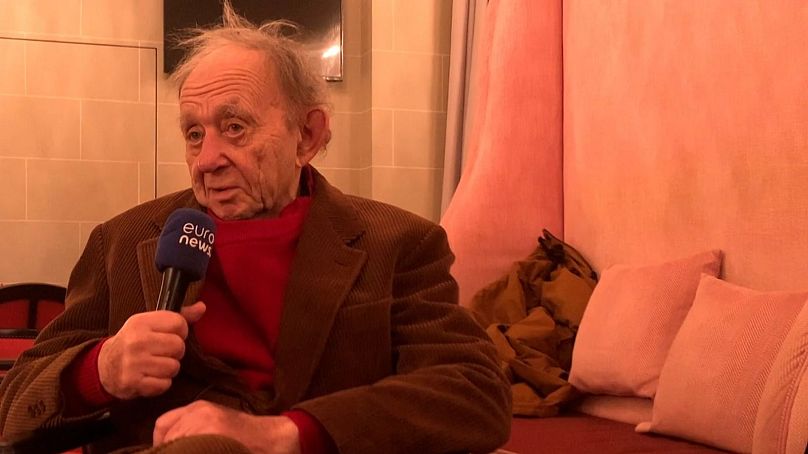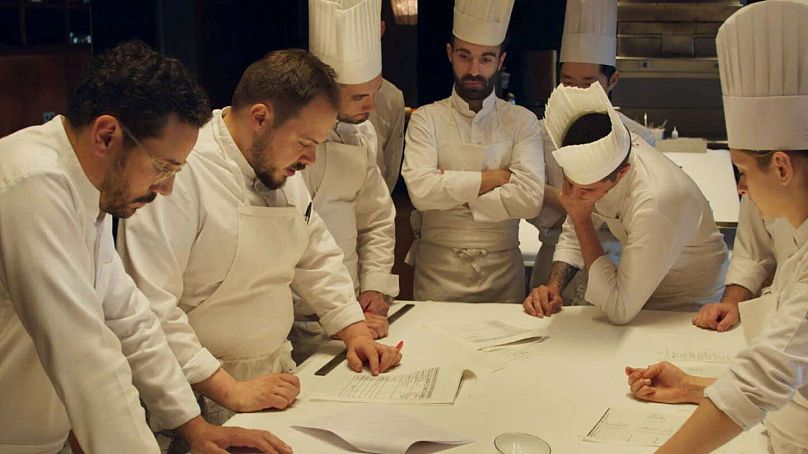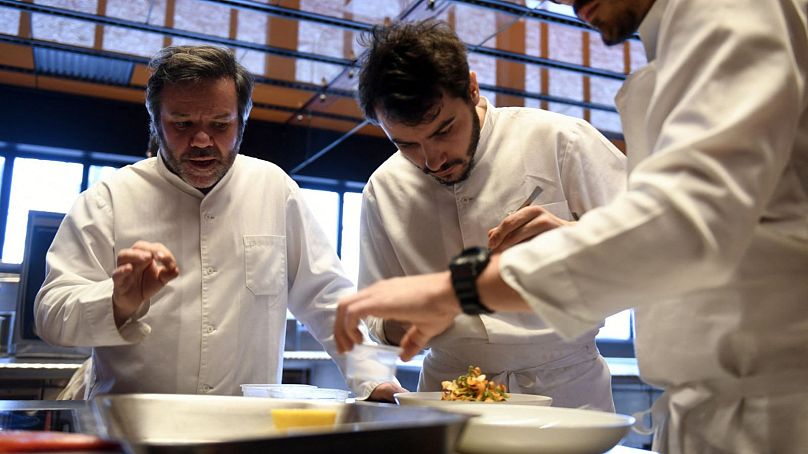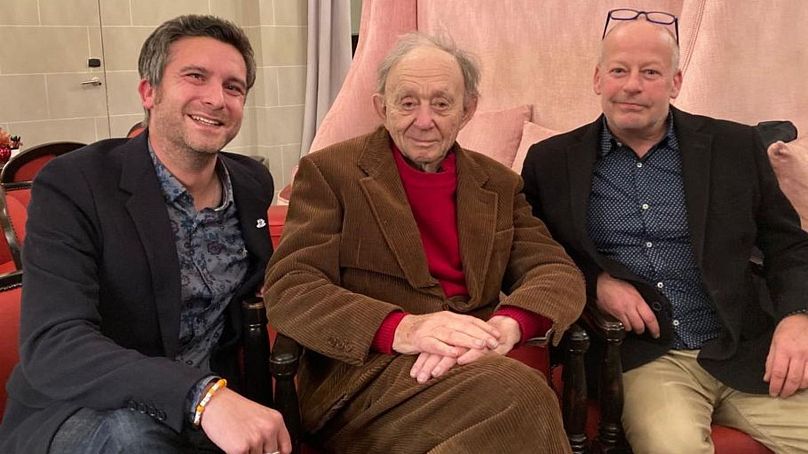Euronews Culture sat down with celebrated US documentary filmmaker Frederick Wiseman to talk about his stunning film 'Menus-Plaisirs - Les Troisgros', his love of French food, and wanting to film in the White House.
Frederick Wiseman has filmed a great many things over seven decades as a documentarian.
From welfare centres (Welfare), the Comédie Française (The Last Letter), dynamic US neighbourhoods (In Jackson Heights), to public libraries (Ex Libris: The New York Public Library) and farming communities (Monrovia, Indiana), his documentaries have shown his boundless interest in institutions and social systems, expansive canvases that tell grander stories about the contemporary human experience.
His body of work is truly unequalled, and with his latest film, Menus-Plaisirs - Les Troisgros, the 93-year-old filmmaker audaciously deals with not one but two intertwined structures - the famed French restaurant, and the multigenerational dynasty of chefs that run it.
The four-hour documentary chronicles the behind-the-scenes at a three-Michelin-star restaurant Les Troisgros in Roanne, touring the culinary empire and showing you how haute cuisine is its own form of artistic creation, as well as the elements that get cut out of all the countless cooking shows on offer.
This film is very much the antidote to those ubiquitous shows: no mean-spirited hysterics, no slave-driving... Instead, we get the sourcing of ingredients, the thought process behind the dishes, the exacting prep, the tasting, the serving, and the choices required to make an institution work. Everything required to make ephemeral works of art.
It's a contemplative tour de force that has a truly life-affirming quality, and reminds you why Wiseman is the grand master of documentary filmmaking.
Euronews Culture caught up with Frederick Wiseman in Lyon, before showing of his 44th feature at the famed Institut Lumière, to talk about his new film - which comfortably made the podium in our Top Films of 2023 list, and may very well be one of the greatest food films of all time.
Euronews Culture: It’s lovely meeting you in Lyon, which is considered the birthplace of cinema. You’re also finally getting your own plaque later today at the Institut Lumière...
Frederick Wiseman: It means a lot, as the Lumière Brothers anticipated pretty much every big topic and subject. They filmed a lot and understood from the very beginning what one could do with cinema. They didn’t have sound at the time, but they heralded the start of documentary filmmaking. That’s the heritage of the Lumière Brothers for me.
Menus-Plaisirs – Les Troisgros took shape during COVID, if I’m not mistaken. What was it about Les Troisgros, as opposed to other French culinary dynasties, that made you want to make this film?
It came up completely by chance. I was visiting a friend in Burgundy for the month of August 2021, and I wanted to thank him and his wife for putting up with me for a month. So, I looked in the Guide Michelin for a nearby, good restaurant. And I found Troisgros - three stars. I hadn't eaten in many three-star restaurants, and I thought it would be fun to go there!
So I made a reservation, and we went there for lunch. During desert, César Troisgros, who's the fourth generation and who's currently running the restaurant, came by the table to say hello. We had this sort of meet and greet, which is characteristic of what happens in French restaurants. And so without planning to, I sort of instinctively blurted out: “I make documentary movies. Would you ever consider having a movie made about your restaurant?” And he said, “Let me talk to my father.” And he came back a half an hour later and said, “Why not?”
Now, I discovered a year later, when I showed Michel and César the film, that his father wasn’t there that day. What he had done was look me up on Wikipedia! I had never looked myself up in Wikipedia, so apparently the entry was sufficiently okay. And within a week, we exchanged a few letters. I waited till COVID subsided a bit, waited till the spring of 2022 to shoot the movie.
Is it true that before filming, you had never seen a film about restaurants?
Yeah, I don't watch television. I had never seen a film about a restaurant - among many other films that I've never seen! Whatever I learned about restaurants is what you see in the film.
So it helped to have a certain amount of... I don't like to use the word “ignorance” in your presence, but...
(Laughs) You can use that term. Because I was totally ignorant before I started! I mean, it's a fair word to use. And it’s true not just of Menus-Plaisirs, but of most of my films. I mean, I'd never spent any time in a welfare centre or the emergency ward of a hospital, or I hadn't run around with the police. That's part of the fun of doing it, because it's always an adventure and I always like to think I've learned something.
Menus-Plaisirs feels like one of your most sensual films – you get the sensation that they’re all there in full force...
I’m glad, because I adored being there because i love to eat good food, and there’s nowhere better! Every aspect of this shoot was a delight for me. We worked 12 hours a day, and in that sense, documentaries are a type of sport! You have to be in good physical shape to keep up. But when the shooting stops, you get to see the cows!
Any dishes you ate there while shooting that stuck with you?
I like everything, and they were very kind enough to invite us to eat with the chefs every day. An invitation it took me less than one second to accept! Everything I ate there was a treat.
One very important aspect of your films is sound, and Menus-Plaisirs is another testimony to the importance of sound in filmmaking. Especially at the end, over the credits. You can still hear the sounds of the kitchen over the black screen, and even at the end of the film, our tastebuds are still tingling...
I always take particular care with sound, it’s true – but everything has got to work. A good image needs good sound. And I play around just as much with the sound editing as with the editing of images.
When it came to filming in the kitchens, it was absolutely mesmerizing watching how it works. The preparation, the planning, the execution, the presentation... All this ephemeral work of art. Did you at any point find a parallel between what you do as a filmmaker and what the chefs do in their domain?
In thinking about it, yes. I mean, I don't want to sound pretentious and it's not up to me to characterize what I do as a work of art. But I think the Troisgros are artists. And what you see is their art being produced, even though it's ephemeral and it's consumed quickly. But they are artists in every sense of the word that painters or writers are artists. And they're great artists, because it's not easy to do what they do. It takes years of training and a lot of imagination.
But you know, in my filmmaking, it’s not about looking for anything – it's about what I see and discover. I don’t ask anything of the people. I probably shot about 35 or 40 hours of footage just in the kitchens, and I never asked anything to the chefs. I had to not get in their way and manage to get the right shots. And their movements in the kitchen are a form of choreography, and they don’t speak much during work. Michel says that at some point in the film – César communicates with his chefs with gestures, and it was all against the clichés of these chefs that shout and behave atrociously. They didn’t do that for me though – that’s how they operate.
It’s true – the most heated moment was a mild irritation about the cooking of calf’s brains!
Because they’re not about shouting or a show. It’s about transmission, and when there was a mild irritation with the young sous-chef who didn’t properly wash the brain, you can see him showing how to do it better, with the Larousse...
There are also a lot of humorous moments in the film – especially that callback to the sous-chef revising his techniques, as well as the guests. That American guest who's sniffing the wine extensively and dramatically cracked me up.
Oh me too!
And these moments also counter the clichés of what we imagine a Michelin restaurant and kitchen to be like.
Those moments are an expression of the spirit of the Troisgros family. They're very intelligent, they're kind, they're imaginative, they are very hardworking. They like their work and they do it very well. And the result is imaginative and joyful.
Over the years in your documentaries, whether it's public housing, libraries, and now restorations, are there any topics or any locations or spaces that you would love to go into and have yet to film?
The White House. It's a joke, of course, but I'd like to film in the White House. But I’d never get permission.
Well, speaking of which, one of my favourite films of yours is Ex Libris, a film I saw in Venice where it premiered, and I only found out afterwards that you'd finished editing the film two days after Trump’s election. On its own, it didn’t necessarily have an overt political dimension. But then it took on a political weight considering the circumstances...
Well, exactly. Trump's behaviour and idiocies gave it a political message, because the contrast between the values that the library represented and what Trump represents is enormous.
I hate to tempt fate, but he’s likely coming back to the White House next year. Would you ever consider embarking on a future project with an overt political goal?
I think a lot of my films are politically tinged, but the politics are expressed indirectly. The films don't slam you over the head with the politics. Law and Order (1969) is a film about the Kansas City Police, and in one aspect, it is very political because the title of the film is ironic because that was the theme of Nixon's campaign in 1968... And what you see in the film is the kind of day-to-day problems that police have to deal with, which have nothing to do with the way Nixon gave expression to the theme of law and order.
At the end of the day, I’m someone who just loves making films - and they will have their contexts.
Do you still find shooting and editing a film still as enjoyable or is it becoming more taxing?
I've never found editing taxing, and I put in long days working as an editor, because I'm very anxious to see how the film is going to come out. And I enjoy doing it. I've never found the making of the film, whether it's the shooting or the editing, a much of a strain. It's not that I don't get tired, because of course I get tired. But one of the things I like about making these kind of movies is that I'm totally immersed in the material. It's a great way to pass the time.
Menus-Plaisirs - Les Troisgros is out now and in our Best Movies of 2023. Check out the video above for extracts of our interview with Frederick Wiseman.















